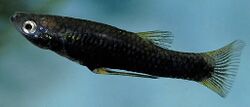Biology:Poeciliopsis occidentalis sonorensis
| Poeciliopsis occidentalis sonorensis | |
|---|---|

| |
| male | |
| Scientific classification | |
| Kingdom: | Animalia
|
| Phylum: | |
| Class: | |
| Order: | |
| Family: | |
| Genus: | |
| Binomial name | |
| Poeciliopsis sonoriensis (Girard, 1859)
| |
The Yaqui topminnow or Sonora topminnow is a species of fish in the family Poeciliidae. Its scientific name is Poeciliopsis sonorensis, sometimes spelled sonoriensis; it is also sometimes considered to be a subspecies of Poeciliopsis occidentalis as P. o. sonorensis.[1]
This fish is native to Mexico, with a few native and introduced populations persisting in Arizona in the United States.[2]
Description
The Yaqui topminnow has an elongated, slightly curved body with a rounded to squared tail fin. The female is generally 3 to 4.5 centimeters long, but may be longer. The male is smaller, generally under 2.5 centimeters long. The anal fin of the male is elongated into a copulatory organ used to inseminate the female. The female develops a gravid abdomen and then bears live young.[3]
The breeding male is black in color with yellow coloration on the fins and body. The female is tan or olivaceous with a pale belly and dark lateral band.[3]
The species is closely related to the Gila topminnow (Poeciliopsis occidentalis), and is sometimes treated as a subspecies. The Yaqui topminnow can be distinguished by its superior mouth, longer snout, and the pattern of lateral banding on the body of the female, which rarely extends anterior to the bases of the pelvic fins.[4]
Biology
This fish lives in shallow, warm, slow-moving waters containing thick algae and debris. It is most common in marshes, especially those fed by springs. It feeds on detritus and small bits of animal and plant material.[5]
The female bears 20 or more young per brood, and may produce a brood about every 20 days. The species breeds year-round in many areas, but in habitats with fluctuating temperatures breeding occurs during the warmer months. The fish rarely lives more than one year.[5]
Conservation
The fish has a limited range. It is considered to be a vulnerable species on the IUCN Red List. It faces the loss of its aquatic habitat types and competition with the western mosquitofish (Gambusia affinis).[2]
Much of its United States population occurs on the San Bernardino National Wildlife Refuge, where it is protected.[2]
References
- ↑ Contreras-Balderas, S. & Almada-Villela, P. 1996. Poeciliopsis sonorensis. The IUCN Red List of Threatened Species 1996. Downloaded on 02 June 2016.
- ↑ 2.0 2.1 2.2 Yaqui Topminnow. Species Profile. United States Fish and Wildlife Service.
- ↑ 3.0 3.1 Minckley, W. L. 1973. Fishes of Arizona. Arizona Game and Fish Department, Phoenix. pp. 199-202. as cited in Cobble, K. S. Yaqui Fishes Recovery Plan. United States Fish and Wildlife Service, 1995.
- ↑ Minckley, W. L. 1973. Fishes of Arizona. Arizona Game and Fish Department, Phoenix. pp. 199-202.
- ↑ 5.0 5.1 Cobble, K. S. Yaqui Fishes Recovery Plan. United States Fish and Wildlife Service, 1995.
External links
- Froese, R. and D. Pauly, Eds. Poeciliopsis sonoriensis. FishBase. 2016.
Wikidata ☰ Q6414729 entry


